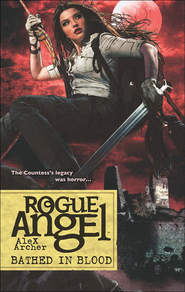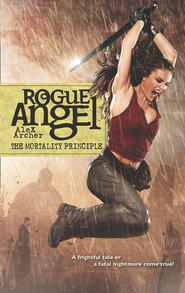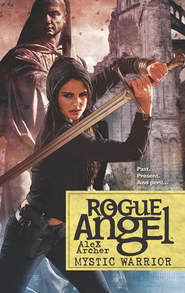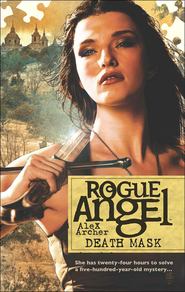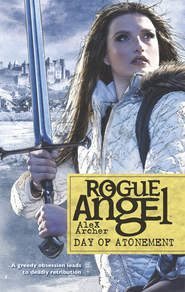По всем вопросам обращайтесь на: info@litportal.ru
(©) 2003-2025.
✖
The Matador's Crown
Автор
Год написания книги
2019
Настройки чтения
Размер шрифта
Высота строк
Поля
“I knew it. The bastard,” Harlow said on a hiss. “He’s implicated himself. He’s probably behind the young musician’s murder, as well.”
One thing was clear, James Harlow really wanted to pin this on Crockett. Annja made a mental note to find out if the two men had a rivalry. She wasn’t about to judge anyone until she got all the facts. And what did she really know about Harlow?
“Crockett’s site was raided, he claims, by the Cádiz police.”
“What? Really? That doesn’t make sense. The authorities have always proved helpful to me.” She heard the familiar sound of a fingernail tapping a watch crystal. “Don’t you suspect it was a lie? The man is shifty.”
“Not sure. The dead body in the dig pit makes me wonder. Crockett said the police killed Simon Klosky, his assistant. Did you know Simon?”
“No, sorry. Another dead man?” The pause on the line was disturbingly long. She had second thoughts about revealing this information to Harlow, but his knowledge of the city and the local archaeological digs and personnel could help her. He finally asked, “Where’s Crockett now?”
“Said he’s going to pack up and get out.”
“Did you call the police?”
“I left a message about finding the dead man. This links me to the two deaths. I worked on the dig for two days. I handled the bull statue before it was stolen.”
“Right. I didn’t think of that. You could also be implicated. But still...you had to call in a report.”
“It’s my duty.”
“So the product circulates in a close range,” Harlow said. “Interesting. Though it could be a starting point for something larger. I can’t pinpoint a source. I suspect they must be operating close to shore, for shipping, perhaps. I haven’t gone so far as to cruise the area, mind you. Skulduggery is not my strong suit. Besides, I imagine there are countless illegal operations in the
area. Always seem to be in rich archaeological geography.”
“Can you run some kind of background check on all of Crockett’s other digs?” she asked. “See if there have been other robberies?”
“Sure, gladly. In fact, I’ve been looking into Crockett since you brought him up yesterday. I’ve got records for most of his work in the area, but I haven’t been able to come up with anything for the past year. He hasn’t turned in any field reports or catalogs. Hence, the reason I suspect him in dirty dealings. Will you be coming to the museum tomorrow?”
“That’s my intention. I still have some final notes to make on the coins. Thanks, James. I’ll talk to you soon.”
When she should have felt relieved to have discussed the details with someone else who could relate, Annja was now uncertain if James Harlow was the man to share that information. He hadn’t sounded gung ho about tracking the looters. Maybe he wasn’t as on board with the idea of refusing artifacts without provenance as she had assumed?
Or maybe it really was a rivalry between the two men, and he was more focused on slandering Crockett’s name than the real issue.
Clicking over to the Photos file on her laptop, Annja opened the six shots of the bronze bull she’d taken on-site and studied the few details in the Moorish carvings around the neck.
Online, she turned to archaeology.net and uploaded the photos of the Baal statue. She was calling it a Baal statue, but really, it could have been made to represent anything, not necessarily the mythic Canaanite god of fertility. She usually got a few replies to her queries, and some often led her to the truth about the particular item she had posted.
“Let’s hope the bull can be traced.”
6
Much as she was ambivalent about the corrida—she was neither for nor against bullfighting—Annja had to admit the atmosphere of the bullring satisfied her love of competitive sporting events. She wasn’t convinced, though, that the corrida was competitive, unless that competition was between the matadors.
Sea scented the air, combined with sweat and women’s perfume. Cádiz didn’t have a stadium for bullfighting so they had driven back to the mainland to Jerez de la Frontera, where the summer festival featured two weeks of fights.
The audience was colorful, peopled with stalwart aficionados sporting cigars, straw hats and beers who had probably never missed a fight in decades, alongside tourists toting seat cushions emblazoned with the stadium’s logo. And local women wearing the flamenco-style dress, which ruffled in many layers from the knee down to the ankle. Odd. They must be dressing for the tourists.
Flamenco guitar music played over the loudspeaker, and down in the barrera—the outer row of seats that circled the ring—an impromptu set of dancers stomped out a beat, arms twisting above their heads. The people in the grandstands around them clapped compas and cheered them on with shouts of “Olé!”
This was a medium-size bullring, probably seating around ten thousand. Garin led her to what he’d said was his usual seat on the shady side of the ring. The most expensive and exclusive seats were in the shade, and in the contrabarrera, which was the second circle of seats around the ring. Close to the action, it was the place to sit for the best view of the matadors, who stood behind the barriers while eyeing up their competition, the bull. Just before the contrabarrera was the circular barrera, where Annja believed Hemingway used to be photographed sitting with cigar in hand.
The first matador had left the ring minutes earlier, and as Annja had learned from the advertisement outside the stadium, there were only two fighters today. Normally there were three, sometimes as many as six. Manuel Bravo would walk onto the grounds soon. Right now they were dragging out the dead bull from the previous fight, harnessed to two mules, accompanied by the orchestra, which played a lively paso doble. A cleanup crew followed with rakes to sweep sand over the blood so as not to spook the next bull.
Annja knew Spaniards were zealous about their national pastime. More than a pastime, it was a sport highly revered throughout the ages. Though the sides for and against bullfighting were equally passionate. She’d watched a few bullfights on YouTube and found she could relate to the art of the fight, yet she couldn’t help but want to look away when it came time for the kill.
Garin tipped his cigar to her before the next fight. The man possessed a wicked charisma. Yet with his twisted morals, he wore the costume of a villain as easily as the hero.
Annja winced. Hero was too powerful a label to give the man. It was also a label used too often and easily by the media. Real heroes never expected to be recognized for a brave act. At his best, Garin Braden tended toward helpful citizen. At his worst? She did not want to be in his vicinity.
The man was an enigma. He’d lived for more than five hundred years thanks to the sword she controlled. He was connected to the battle sword, having been there when Joan of Arc had been burned at the stake. He’d witnessed the British soldier break her sword and scatter the pieces among the crowd who had damned Joan and made her a martyr through their own ignorance.
For some reason Garin and his friend Roux, whom Garin had been apprentice to at the time of Joan of Arc’s burning, had both obtained immortality that fateful day. And a lifelong connection to the ineffable sword.
The two men had tracked the pieces over the centuries, and when finally the last piece had been placed, Annja had touched the sword—and as it had become whole, it had also become a part of her. She had not asked for possession of such an object, nor had she anticipated anything of the sort. But now that she did wield the sword, she did so as if it had always been meant for her. It was, in fact, her destiny. Only she could bring it forth from the otherwhere, and as soon as she released it, it was made intangible once again, unless she allowed another to hold it. Then the battle sword would maintain its solid state until she decided it should not. She couldn’t explain the innate process even if a gang of terrorists held AK-47s to her heart. That was just how it worked.
Garin wanted the sword—hell, she’d let him hold it for a few moments of wonder—but she hadn’t decided if it was because he believed keeping it whole would render him mortal or if breaking it would ensure his continued immortality.
Either way, she never let down her guard around Garin Braden.
She accepted the beer he offered her, which had been delivered to his hands moments after they sat down. Obviously, he held some status here. Then again, the man could make things happen no matter where he was. That wasn’t incomprehensible magic, but rather confident command honed over centuries.
She hadn’t taken time to shower after he’d dropped her at the hotel, she’d been so involved in research. She still wore the ponytail she’d hastily tied back this morning after her escape from the hostel, which had dried tightly and was probably looking pretty scrappy right now. Add to that her dark, loose camo pants, standard wear for Annja Creed, adventurer and archaeologist, and a T-shirt. Garin was just lucky she hadn’t dug her boonie hat out of the backpack. But from where they sat the sun promised to stay out of her eyes.
“So how is it you always manage to stumble upon dead bodies, Annja? That’s, what? Two in one day.” He tilted his beer bottle to her in salute, then swallowed down half.
“I think I have a kind of dead-body radar, actually. It does kick in more often than not. I’m never to blame, of course.”
“Course not. Not my sword-wielding adventuress. How is the sword, by the by?”
“True, straight and always there when I need it.”
“They say the man in the hotel room was killed by a sword.”
“Really? Why didn’t you mention that on the drive out of town?”
“You didn’t ask about it.”
She gaped at him.
With a shrug, he added, “I suspect the authorities decided to keep the details from you in case you could be goaded to cough up said details.”
“And how do you have the details?”
“I heard it on the radio.”
Officer Soto had mentioned a media leak. Was there a mole on the force? Interesting. Perhaps there was a dirty cop who had an interest in artifacts?






